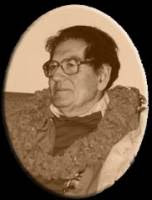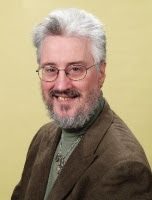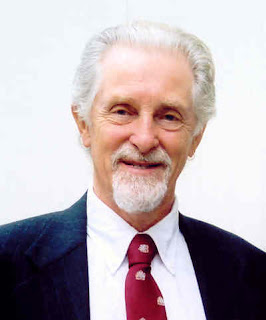 |
| She's not on the list, but I think we dated. |
For those of you who read my blog who aren't Pagans, you still might find this list interesting. Paganism is one of the fastest growing religions in the United States, and the people who have contributed to it are pretty fascinating. A few of the people on this list did not practice Witchcraft or any other Pagan Path, and some of them would have been surprised to hear themselves referred to as Pagans. What was important to my list, was gathering up individuals who have contributed to the development of Modern Paganism as a whole, which is why there are some non-Pagan folk.
I don't expect everyone in the world to agree with my "Top 3," but that's the point of lists; they are designed to attract controversy, and to get people to argue and disagree. This list has a very strong "Wiccan" slant, which isn't really fair when coming up with a "Pagan" list, but since Wicca is the largest Pagan subset, it shouldn't come as a huge surprise. This list is limited to individuals who were/are most active in the 20th Century up until the present. I had to draw the line somewhere, I already ended up with more people on my list than I had anticipated (every time I thought I was done, I realized I had slighted someone else I thought was important). Enjoy!
American Runners-Up
 |
| Carl Weschcke President of Llewellyn |
Why he's on this list: He's the President of Llewellyn, duh. Love 'em or hate'em, it's impossible to deny the influence Llewellyn has had on Modern Paganism. You might not be proud of it, but you've got some stuff on your bookshelf with that crescent moon on the spine. Llewellyn has introduced more people to Modern Paganism than any other publisher, and done so through well edited books. He also published the first Book of Shadows back in the 1970's.
Why he's not higher: He's the President of Llewellyn.
 |
| Margot Adler |
Who is she?: That's Margot Adler, NPR Correspondent and author of Drawing Down the Moon
Why she's on this list: I want to just scream "She's Margot Adler!" but that's probably not good enough. For several decades DDtM was one of the five "go to" books on Modern Paganism, and the first real, honest survey of Pagan practices in the United States. While DDtM is a bit dated today, it's still a fascinating history book detailing where we've come from.
Why she's not higher: Though a gifted writer, Adler chose to focus on other things, she's only written three books.
 |
| Teen Witch Mother- Silver Ravenwolf |
Who is she?: Silver Ravenwolf, author of Teen Witch and To Ride a Silver Broomstick
Why she's on this list: I'm going to take some heat for this one, but there are a lot of people in the Modern Craft who came to it through Silver Ravenwolf. For much of the past two decades she's been the most popular Pagan author on the planet. As much as I dislike some of her books, there's no denying that she's an extremely talented writer. I still like To Ride a Silver Broomstick.
Why she's not higher: Two words: Teen Witch.
 |
| Scott Cunningham |
Who is he?: Scott Cunningham, author of Wicca: A Guide for the Solitary Practitioner
Why he's on this list: Cunningham might have been the most popular Pagan writer of the 80's and early 90's, right as Paganism was moving more into the mainstream and becoming more popular. There's an entire generation that grew up reading and recommending Wicca: A Guide for the Solitary Practitioner. His "Cunningham's Guide To _____" series of books are still must have reference material. Though Scott left us in 1993, his books still loom large in many a Pagan library.
Why he's not higher: Cunningham never became much of a media presence.
 |
| Victor Anderson |
Why he's on this list: Victor (along with his wife Cora) popularized the Feri Tradition. Not familiar with the Feri Tradition? You aren't alone, but you've been exposed to it whether you know it or not. Some of the most influential Pagans of the last forty years come from the Feri Tradition, people like Starhawk, T. Thorn Coyle, and Gwydion Pennderwen. Feri is also an inescapable presence in California.
Why he's not higher: There's no "eclectic Feri tradition" and the tradition its self has a limited presence outside of the Bay Area (when compared with other traditions). Also, the Andersons never published much, just a few collections of Victor's poetry.
 |
| Druid Extrodinaire Issac Bonewits |
Who is he?: Isaac Bonewits author of Real Magic and founder of Ár nDraíocht Féin, the world's largest Contemporary Druid Organization.
Why he's on this list: There's about a hundred reasons to put him on this list, from his bachelor of arts degree in Magic from Berkeley (seriously) to his founding of ADF, to his intelligent and scholarly approach to magick and Paganism, Bonewits has had an influence on almost every aspect of Modern American Neo-Paganism (and he coined Neo-Paganism). Issac passed from this world in August of 2010.
Why he's not higher: Revered on the Pagan lecture circuit, Bonewits's scholarly approach kept him from attaining the success of a Silver Ravenwolf.
 |
| Oberon Zell-Ravenheart (Joking about the Dumbledore thing) |
Why he's on this list: One of the first people to realize that magicians, Wiccans, Witches, Druids, and Heathens had a lot in common and were all "Pagans" was Oberon. He popularized the word Pagan as an umbrella term for a very diverse group of people. With his wife Morning Glory he helped to define the concept and practice of polyamory, and before the internet his magazine The Green Egg provided a world-wide forum for Pagans to speak their minds. Due to the power of The Green Egg (read by many leaders in the community), his Church of All Worlds had a huge influence on American Paganism.
Why he's not higher on this list: Until recently, Zell did not have much of a literary presence. In the age of the internet the importance of The Egg has been overlooked by some.
British Runners Up
Perhaps due to geography (I am an American after all) my list of British Runners Up is a bit smaller, however, the Brits make up for it all in the top spots.
 |
| Robert Cochrane |
Why he's on this list: Cochrane was one of the first people to come forward with a Witch tradition somewhat different than what was first written about by Gerald Gardner. Peers described his rituals as high energy, and he took Witchcraft out of the parlor and back outside into nature. After a falling out with Gardner, he coined the term "Gardnerian" as a derogatory term for Gardner's version of Witchcraft. Correspondences with American Joe Wilson led to the establishment of the 1734 Tradition.
Why he's not higher: Cochrane alienated many of his followers and committed suicide in 1966, he also did not leave much in the way of a literary legacy.
 |
| Dion Fortune |
Why she's on this list: Biographers of Fortune disagree about whether or not she was even Pagan (as we understand it today), but her novels, especially The Sea Priestess (published in 1938) were hugely influential in the development of Modern Witchcraft. Her novel The Goat Foot God, about the Greek God Pan, helped establish the Horned God as "the god" in the Modern Craft. She was also an accomplished magician and is still influential in magickal circles today. One of the first women to have a major influence on both magick and Paganism.
Why she's not higher: By the end of her life Fortune had become a mystical Christian, and was never officially a part of any explicitly Pagan tradition.
Who is he: Raymond Buckland, author and pioneer.
Why he's on this list: Buckland was the first Gardnerian Wicca initiate to practice and initiate in the United States. His book The Tree, was one of the first "do it yourself" Witchcraft books in the world, with complete rituals, a rarity in the early 1970's. Buckland's Complete Book of Witchcraft (or Big Blue) is one of the most well known Witchcraft guides in existence. Buckland has also appeared in numerous television shows, and is a successful writer of fiction. He's also a remarkably nice guy.
Why he's not higher: I'm not a big fan of "Saxon Witchcraft."
 |
| Alex Sanders |
Why he's on this list: During the late 60's and into the 1970's Sanders was the most public (and in some cases) notorious Witch in Great Britain. Sanders appeared in numerous television documentaries and even released a record "A Witch is Born." While his title "King of the Witches" was self-proclaimed, he did initiate many important Witches, most notably Janet and Stewart Farrar who went on to popularize many of Sanders' teachings. Sanders also helped to create a more tolerant Wicca having come out as a gay man late in life.
Why he's not higher: Sanders was not a writer, and his quest for attention and knack for burning bridges alienated him from many in the Pagan Community.
 |
| The Grand Lady of the Craft Doreen Valiente |
Why she's on this list: Even if you've never read a book by Valiente, you've read her words. Much of the ritual used by Modern Witches was composed and arranged by Valiente. While she didn't write all of The Charge of the Goddess her selective use of material and knack for pacing produced what became the definitive version. During the 1970's and 80's her books on Paganism were widely read and hugely influential. Much of what's in Modern Wicca would sound very different if not for the influence of Valiente.
Why she's not higher: Geez, not everyone can be in my top three.
 |
| Uncle Al Aleister Crowley |
Why he's on this list: The better question is probably why he's not higher on my list. Much of Crowley's poetry and other writings has worked it's way into Wiccan Ritual. His approach to magick borders on definitive and continues to influence. Crowley founded the rather Pagan religion of Thelema and wrote the majority of the rituals in the OTO, both groups which influenced Modern Witchcraft.
Why he's not higher: Much of his approach to magick was a refining of earlier ideas, and he's fourth or fifth on my list, geez, that's pretty good.
My Three Most Influential People in the Development of Modern Paganism
 |
| Starhawk |
Who is she: Activist and writer Starhawk.
Why she's on this list: While Starhawk might not have been the first person to infuse Modern Paganism with an activist streak, she's been the most high profile. She also helped to turn Witchcraft into a religion that promotes female self-empowerment. She was also the first person to publicize many of the teachings and practices of the Feri Tradition. She might also be the most gifted writer to ever pen a "Pagan How To" book. I'm kind of surprised she ended up here too, but the more I think about it, the more I've become comfortable with it. Starhawk has changed Modern Paganism.
Why she's not higher: Well she didn't start it.
 |
| Margaret Murray |
Why she's on this list: The Witch-Cult in Western Europe (1923) was not the first book to suggest that the Western European witch hunts of the Middle Ages were an organized attempt to destroy a native European pagan religion, but it was the most influential. In Witch-Cult, Murray turned Witchcraft into a sympathetic tradition, and paved the way for people wanting to be identified as Witches. Her works also put the words esbat and coven into the English lexicon. Her second book on Witchcraft, The God of the Witches, helped establish the Horned God as a major Wiccan deity.
Why she's not higher: Her works paved the way for Modern Witchcraft, but they didn't include a Goddess, and most of her theories have been discarded by modern scholars. However her influence on Modern Paganism remains enormous.
 |
| Gerald Gardner One day people will be building statues of this guy, seriously. |
Who is he: Gerald Gardner, the first public modern Witch.
Why he's on this list: Gardner was the first person in Britain to publicly call himself a Witch, and to call Witchcraft a religion. From the early 50's until his death in the early 60's he was the most famous Witch in Great Britain, perhaps the world. His books, Witchcraft Today and The Meaning of Witchcraft were the first two books to present Witchcraft as a valid faith. There are also some scholars who claim "he made the whole thing up," and while I disagree, there's little doubt that many of the rituals found in the Modern Craft were written or influenced by Gardner.
Why he's number one: Gardner-inspired Witchcraft is the dominant form of Witchcraft in the Western World, and by extension the most dominant form of Western Paganism.

Hi - thanks for this post. While not disagreeing with the rankings etc, I do wish to present a different view on Dion Fortune.
ReplyDeleteYou write, "By the end of her life Fortune had become a mystical Christian, and was never officially a part of any explicitly Pagan tradition."
While the latter part of this is undoubtedly true, the first part, I feel, simply reproduces a misunderstanding of Dion. The actual reality is Dion interwove and went beyond what we call 'paganism' and 'Christianity' in her magic. To quote myself (little time here):
"Dion promoted and practiced the Three Fold Way, an integrated approach to the entire dismembered corpus of the western tradition as encompassed in the paths of Hermetic Mysteries, Devotional Mysticism and Nature Contacts. As Gareth Knight has shown, the apparent oscillation of Dion between ‘paganism’ and Christianity is a chimera and outside commentators who presumed to see certain outer activities as adherence to one path over another were not seeing the full picture, which was ever integrated."
See article at: http://magicoftheordinary.wordpress.com/2011/01/10/dion-fortune-and-the-western-way/
and Gareth Knight, "Dion Fortune and the Threefold Way".
Thanks :)
Thanks for the post. It was hard to boil down all of those figures to just two or three sentences.
ReplyDeleteI was diagnosed with Parkinson’s disease four years ago. For over two years, I relied on Levodopa and several other medications, but unfortunately, the symptoms kept getting worse. The tremors became more noticeable, and my balance and mobility started to decline quickly. Last year, out of desperation and hope, I decided to try a herbal treatment program from NaturePath Herbal Clinic.
ReplyDeleteHonestly, I was skeptical at first, but within a few months of starting the treatment, I began to notice real changes. My movements became smoother, the tremors subsided, and I felt steadier on my feet. Incredibly, I also regained much of my energy and confidence. It’s been a life-changing experience I feel more like myself again, better than I’ve felt in years.If you or a loved one is struggling with Parkinson’s disease, I truly recommend looking into their natural approach. You can visit their website at www .naturepathherbalclinic .com. info@naturepathherbalclinic .com